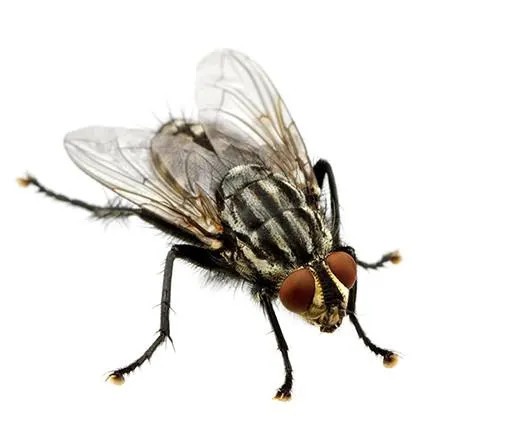Flies are a common nuisance, spreading diseases and contaminating food. Understanding their life cycle and habits is crucial for effective fly control. This guide provides practical solutions and preventive measures to eliminate flies from your home and garden.
 alt text: Close-up of a house fly on a surface.
alt text: Close-up of a house fly on a surface.
Flies, particularly the common housefly, breed in decaying organic matter like rotten food, manure, and garbage. Their rapid maturation from egg to adult in just ten days can quickly lead to infestations. Sanitation and exclusion are key to long-term fly control.
Effective Fly Control Management: Sanitation and Beyond
A successful fly control program begins with meticulous sanitation and exclusion practices. This involves eliminating breeding grounds and preventing fly entry. Beyond these foundational steps, various insecticide options are available, including liquid concentrates, insecticide dusts, aerosols, fly light traps, fogging materials, and baits.
 alt text: Various fly traps and control products.
alt text: Various fly traps and control products.
For drain flies common in kitchens and restaurants, bio drain treatment gels containing microbes can effectively break down organic matter in drains, eliminating their breeding source. UV light traps are also highly effective, particularly in commercial settings, by attracting and trapping flies. Glue traps offer another trapping option.
Natural Remedies to Get Rid of Flies: DIY Solutions
Natural remedies can be highly effective for fly control, especially in smaller spaces. Outdoor fly traps baited with putrescent materials attract and trap large numbers of flies. For indoor infestations, essential oils and other natural repellents offer effective solutions.
Here are five proven natural remedies:
1. The Rotten Food Trap
Utilize rotten food scraps by placing them in a sealed container with small holes punched in the lid. Flies will enter to feed and become trapped.
2. The Apple Cider Vinegar and Dish Soap Trap
Mix apple cider vinegar, sugar, dish soap, and water in a container. The sweet solution attracts flies, while the soap breaks the surface tension, causing them to drown.
3. The Red Wine Trap
Old red wine mixed with dish soap and covered with a plastic wrap with small holes makes an effective fly trap. The wine’s aroma attracts flies, and the soap prevents their escape.
4. Essential Oil Repellents
Strong-smelling essential oils like clove, pine, lemongrass, eucalyptus, lavender, mint, rosemary, peppermint, tea tree, and citronella repel flies. Apply a few drops to cloth strips or use a spray bottle to deter flies. A combination of lemon and eucalyptus oil is particularly effective.
5. Fans and Citronella Candles
Fans disrupt the calm air flies prefer, making it difficult for them to fly. Citronella candles, while primarily used for mosquito control, can also effectively repel flies in enclosed spaces.
Identifying Common Fly Species
Correctly identifying the type of fly infestation is crucial for targeted control. Common types include:
Filth Flies
House flies are the most common filth fly, known for spreading diseases like food poisoning and dysentery. They breed in garbage, manure, and decaying organic matter.
Small Flies
Various small flies (about 1/4 inch) infest food preparation areas and can carry disease-causing organisms. Common examples include fruit flies, drain flies, and phorid flies.
Nuisance and Biting Flies
These flies, including stable flies and horse flies, breed in decaying organic matter and animal waste. While some are simply a nuisance, biting flies feed on mammalian blood and inflict painful bites, potentially transmitting diseases.
Preventing Fly Infestations: Proactive Measures
Preventing fly infestations requires a proactive approach focused on sanitation and exclusion:
Sanitation is Key
Regularly cleaning garbage cans with a bleach solution, properly managing compost bins, and promptly removing pet waste eliminates breeding sites. Good drainage is also essential to reduce moisture that attracts flies.
Decomposing Organic Waste Management
Properly dispose of decomposing organic waste, including food scraps, rotting vegetables, and animal feces. Seal garbage cans tightly and keep them away from entrances. Repair damaged window screens and doors to prevent fly entry. Consider using air curtains for doorways that must remain open.
Frequently Asked Questions About Fly Control
What attracts flies?
Flies are drawn to food waste, pet waste, overripe fruits, and standing water.
Are there natural fly repellents?
Yes, essential oils like lavender and eucalyptus, vinegar traps, and wine traps are effective natural remedies.
How can I prevent flies from entering my home?
Seal cracks and openings, install window screens, manage waste properly, and keep doors closed.
How do I safely get rid of flies in my kitchen?
Use non-toxic traps, maintain cleanliness, store food in airtight containers, and dispose of garbage regularly.
Can flies spread diseases?
Yes, flies can transmit diseases like food poisoning and dysentery through contamination.